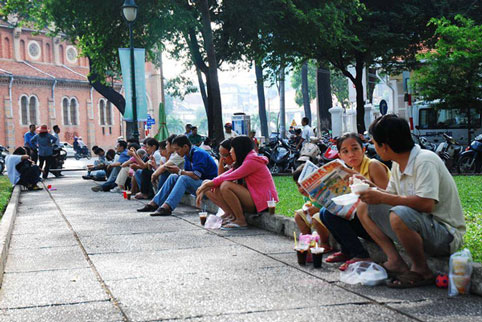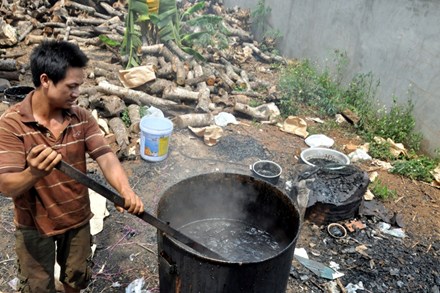Vietnam has always been known as a country strong in exporting coffee products. However, recently, the situation of "coffee without coffee origin" and "dirty coffee" has reached alarming levels, making consumers anxious. Is clean coffee only for export, while domestic people have to "drink artificial coffee" and "dirty coffee"? Are there any regulations managing this behavior, and what are the penalties?
At the end of June and the beginning of July, the Vietnam Standards and Consumers Association (Vinatas) conducted a survey on the caffeine content in 253 samples of black coffee in 4 provinces and cities of Vietnam, including Hanoi, Ho Chi Minh City, Binh Duong, and Soc Trang.
The survey samples were randomly purchased at various coffee businesses including: Coffee shops (decent stores); small coffee shops (street stalls); hospital canteens; sidewalk coffee shops, and pushcarts.
The survey results show that nearly one-third of the consumed coffee (accounting for 30.04%) had a very low caffeine content (less than 1g/L), notably alarming with 5 samples containing no caffeine at all. These samples were all found from familiar daily selling points - small coffee shops, sidewalk stalls, and street coffee vendors.

Street Coffee - a cultural trait of Saigon
Standard for ground coffee
Currently, ground coffee produced in the Vietnamese market must comply with the National Standard TCVN 5251:2005 for ground coffee. The raw materials used for processing ground coffee must meet TCVN 5250:2015 standards. The physical-chemical characteristics requirements for ground coffee are that it must have a caffeine content, calculated by % mass, of not less than 1%.
Therefore, typically, the act of producing coffee with a caffeine content not reaching 1% or having no caffeine will be penalized under the regulations in Clause 2 Article 26 of Decree 178/2013ND-CP on administrative penalties for food safety violations.
Clause 2 provides particularly for violations of other regulations on ensuring food safety in production, trading, and importing food as follows:
The acts of producing, importing, or selling food, food materials, food additives, food processing aids, utensils, packaging materials, and containers that do not meet technical standards or food safety regulations shall be fined proportionally to the value of the violating goods batch. The maximum fine for this violation is from VND 80,000,000 to VND 100,000,000 for a goods batch worth over VND 320,000,000.
According to the general assessment of Vietnamese enterprises, the process of processing coffee and applying for production and processing licenses for ground coffee is currently quite stringent, requiring the submission of various documents such as certificates of food safety compliance and periodic inspection reports; packaging must not use recycled materials. However, there is still no standard for disclosing the composition of ground coffee, as packaging only declares the caffeine content. Therefore, phenomena where some establishments mix additives, leading to terms like "corn coffee" and "bean coffee", arise. Such lacks a benchmark for inspection, comparison, and determination. Inspectors do not have the basis to determine the proportions of these ingredients or their impact on consumers' health.
The survey shows that the proportion of coffee shops with zero or very minimal caffeine content among pushcart vendors, hospital canteens, and sidewalk stalls is nearly half - 47.54%. It's an alarming situation when these places serve a large number of consumers without undergoing inspection or being inspectable. Evidence suggests that the health of Vietnamese people is being severely compromised, and the law is not keeping up with practical realities.
Should the issue of food safety be criminalized?
Regarding food safety violations, the 1999 Penal Code has regulations in Article 244 on "Crimes of violating food hygiene and safety regulations." "Anyone who processes, supplies, or sells food knowing it does not meet hygiene safety standards causing harm to health or life of consumers shall be subject to imprisonment from one to five years.
- If the crime causes very serious consequences, the offender shall be subject to imprisonment from three to ten years.- If the crime causes particularly serious consequences, the offender shall be subject to imprisonment from seven to fifteen years.- The offender may also be fined from VND 5,000,000 to VND 50,000,000, banned from holding certain positions or practicing certain professions for one to five years.”
According to the regulations, serious harm to life or health of consumers is a mandatory sign for the establishment of the crime. However, in practice, drinking a dirty coffee cup daily, or two to three cups at most, cannot severely affect health per Article 244, only possibly over months or years. By then, criminal prosecution is unlikely.

Dirty coffee production in the coffee capital BMT
Food safety has always been a daily concern for Vietnamese people. One could say that selling substandard food is as serious as robbery or murder. If put to public vote, the majority of people would agree to increased criminal penalties for food safety issues.
Data from Knowledgeable Youth
 Article table of contents
Article table of contents





.Medium.png)
.Medium.png)
.Medium.png)
.Medium.png)
